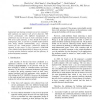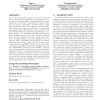5 search results - page 1 / 1 » Analysis of consensus under intuitionistic fuzzy preferences |
EUSFLAT
2001
13 years 5 months ago
2001
We extend the main idea of a fuzzy analysis of consensusintroduced by Spillman, Spillman and Bezdek [12]- that is based on a concept of a distance from consensus - to a case when ...
EUSFLAT
2009
13 years 2 months ago
2009
We consider some existing similarity measures for Atanassov's intuitionistic fuzzy sets (A-IFSs, for short). We show that neither similarity measures treating an A-IF as a sim...
CISIS
2009
IEEE
13 years 9 months ago
2009
IEEE
Appropriate use of group consensus on service consumers’ QoS opinions can improve web service discovery. Web service participants with different backgrounds or preferences may n...
SIGECOM
2010
ACM
13 years 9 months ago
2010
ACM
One of the fundamental problems in the theory of social choice is aggregating the rankings of a set of agents (or voters) into a consensus ranking. Rank aggregation has found appl...
AI
2002
Springer
13 years 4 months ago
2002
Springer
Automated negotiation is a key form of interaction in systems that are composed of multiple autonomous agents. The aim of such interactions is to reach agreements through an itera...


